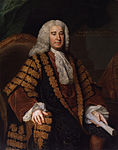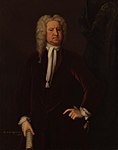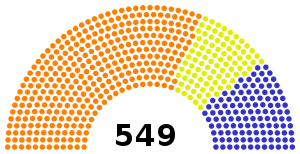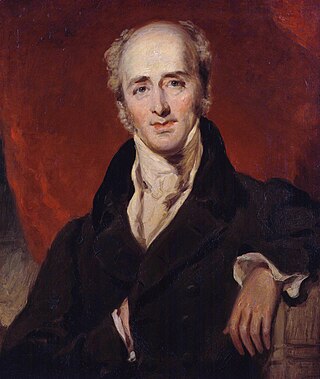
The 1832 United Kingdom general election was held on 8 December 1832 to 8 January 1833, to elect members of the House of Commons, the lower house of Parliament of the United Kingdom. It was the first held in the Reformed House of Commons following the Reform Act, which introduced significant changes to the electoral system.

The 1830 United Kingdom general election was held on 29 July 1830 to 1 September 1830 to elect members of the House of Commons, the lower house of Parliament. Triggered by the death of King George IV, it produced the first parliament of the reign of his successor, King William IV. Fought in the aftermath of the Swing Riots, it saw electoral reform become a major election issue. Polling took place in July and August and the Tories won a plurality over the Whigs, but division among Tory MPs allowed Earl Grey to form an effective government and take the question of electoral reform to the country the following year.

The 1807 United Kingdom general election was the third general election after the Acts of Union 1800, held from 4 May 1807 to 9 June 1807.

The 1812 United Kingdom general election was the fourth general election after the Union of Great Britain and Ireland, held on 5 October 1812 to 10 November 1812, taking place at the height of the Napoleonic Wars.
Buckinghamshire is a former United Kingdom Parliamentary constituency. It was a constituency of the House of Commons of the Parliament of England then of the Parliament of Great Britain from 1707 to 1800 and of the Parliament of the United Kingdom from 1801 to 1885.
The 1790 British general election returned members to serve in the House of Commons of the 17th Parliament of Great Britain to be summoned after the merger of the Parliament of England and the Parliament of Scotland in 1707.
The 1780 British general election returned members to serve in the House of Commons of the 15th Parliament of Great Britain to be summoned after the merger of the Parliament of England and the Parliament of Scotland in 1707. The election was held during the American War of Independence and returned Lord North to form a new government with a small and rocky majority. The opposition consisted largely of the Rockingham Whigs, the Whig faction led by the Marquess of Rockingham. North's opponents referred to his supporters as Tories, but no Tory party existed at the time and his supporters rejected the label.

The 1774 British general election returned members to serve in the House of Commons of the 14th Parliament of Great Britain to be held, after the merger of the Parliament of England and the Parliament of Scotland in 1707. Lord North's government was returned with a large majority. The opposition consisted of factions supporting the Marquess of Rockingham and William Pitt, 1st Earl of Chatham, both of whom referred to themselves as Whigs. North's opponents referred to his supporters as Tories, but no Tory party existed at the time and his supporters rejected the label.
The 1768 British general election returned members to serve in the House of Commons of the 13th Parliament of Great Britain to be held, after the merger of the Parliament of England and the Parliament of Scotland in 1707.

The 1761 British general election returned members to serve in the House of Commons of the 12th Parliament of Great Britain to be summoned, after the merger of the Parliament of England and the Parliament of Scotland in 1707. This was the first Parliament chosen after the accession to the throne of King George III. It was also the first election after George III had lifted the conventional proscription on the employment of Tories in government. The King prevented the Prime Minister, the Duke of Newcastle, from using public money to fund the election of Whig candidates, but Newcastle instead simply used his private fortune to ensure that his ministry gained a comfortable majority.
The 1754 British general election returned members to serve in the House of Commons of the 11th Parliament of Great Britain to be summoned, after the merger of the Parliament of England and the Parliament of Scotland in 1707. Owing to the extensive corruption and the Duke of Newcastle's personal influence in the pocket boroughs, the government was returned to office with a working majority.
The 1741 British general election returned members to serve in the House of Commons of the 9th Parliament of Great Britain to be summoned, after the merger of the Parliament of England and the Parliament of Scotland in 1707. The election saw support for the government party increase in the quasi-democratic constituencies which were decided by popular vote, but the Whigs lost control of a number of rotten and pocket boroughs, partly as a result of the influence of the Prince of Wales, and were consequently re-elected with the barest of majorities in the Commons, Walpole's supporters only narrowly outnumbering his opponents.

The 1734 British general election returned members to serve in the House of Commons of the 8th Parliament of Great Britain to be summoned, after the merger of the Parliament of England and the Parliament of Scotland in 1707. Robert Walpole's increasingly unpopular Whig government lost ground to the Tories and the opposition Whigs, but still had a secure majority in the House of Commons. The Patriot Whigs were joined in opposition by a group of Whig members led by Lord Cobham known as the Cobhamites, or 'Cobham's Cubs'.

The 1727 British general election returned members to serve in the House of Commons of the 7th Parliament of Great Britain to be summoned, after the merger of the Parliament of England and the Parliament of Scotland in 1707. The election was triggered by the death of King George I; at the time, it was the convention to hold new elections following the succession of a new monarch. The Tories, led in the House of Commons by William Wyndham, and under the direction of Bolingbroke, who had returned to the country in 1723 after being pardoned for his role in the Jacobite rising of 1715, lost further ground to the Whigs, rendering them ineffectual and largely irrelevant to practical politics. A group known as the Patriot Whigs, led by William Pulteney, who were disenchanted with Walpole's government and believed he was betraying Whig principles, had been formed prior to the election. Bolingbroke and Pulteney had not expected the next election to occur until 1729, and were consequently caught unprepared and failed to make any gains against the government party.

The 1722 British general election elected members to serve in the House of Commons of the 6th Parliament of Great Britain. This was the fifth such election since the merger of the Parliament of England and the Parliament of Scotland in 1707. Thanks to the Septennial Act 1715, which swept away the maximum three-year life of a parliament created by the Meeting of Parliament Act 1694, it followed seven years after the previous election, that of 1715.

The 1715 British general election was held on 22 January 1715 to 9 March 1715, to elect members of the House of Commons, the lower house of the Parliament of Great Britain. It returned members to serve in the House of Commons of the 5th Parliament of Great Britain to be held, after the 1707 merger of the Parliament of England and the Parliament of Scotland.
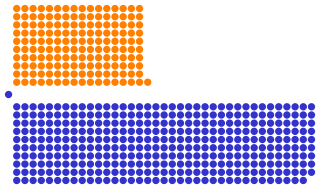
The 1713 British general election was held on 22 August 1713 to 12 November 1713, to elect members of the House of Commons, the lower house of the Parliament of Great Britain. It produced further gains for the governing Tory party. Since 1710 Robert Harley had led a government appointed after the downfall of the Whig Junto, attempting to pursue a moderate and non-controversial policy, but had increasingly struggled to deal with the extreme Tory backbenchers who were frustrated by the lack of support for anti-dissenter legislation. The government remained popular with the electorate, however, having entered into peace negotiations ending the War of the Spanish Succession and later agreeing on the Treaty of Utrecht. The Tories consequently made further gains against the Whigs, making Harley's job even more difficult. Contests were held in 94 constituencies in England and Wales, some 35 per cent of the total, reflecting a decline in partisan tension and the Whigs' belief that they were unlikely to win anyway.

The 1710 British general election produced a landslide victory for the Tories. The election came in the wake of the prosecution of Henry Sacheverell, which had led to the collapse of the previous government led by Godolphin and the Whig Junto.

The 1708 British general election was the first general election to be held after the Acts of Union had united the Parliaments of England and Scotland.
After the conclusion of the 1698 English general election the government led by the Whig Junto believed it had held its ground against the opposition. Over the previous few years, divisions had emerged within the Whig party between the 'court' supporters of the junto and the 'country' faction, who disliked the royal prerogative, were concerned about governmental corruption, and opposed a standing army. Some contests were therefore between candidates representing 'court' and 'country', rather than Whig and Tory. The Whigs made gains in the counties and in small boroughs, but not in the larger urban constituencies. After Parliament was dissolved on 7 July 1698, voting began on 19 July 1698 and continued until 10 August, with an order directing the new House of Commons to meet on 24 August 1698.
